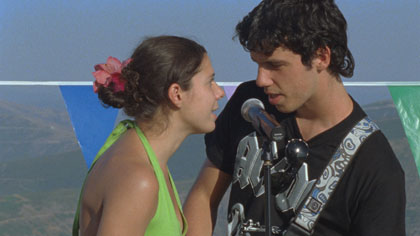Primary navigation

Portugal/France 2008

Reviewed by Jonathan Romney
Our synopses give away the plot in full, including surprise twists.
Arganil, central Portugal. Director Miguel Gomes is making a film, but his producer complains that he isn’t shooting the proposed script. Documentary-style footage portrays summer pursuits in the region, including boar hunting, religious parades and fetes featuring amateur dance bands; residents interviewed include Paulo, a heavy-drinking local legend. Despite Gomes’ lack of organisation, a fiction emerges, acted by locally recruited talent. Teenaged Tânia sings in the band Estrelas do Alva alongside her over-protective father Domingos. Her visiting cousin Hélder joins as guitarist. Tânia and Hélder are mutually attracted, but he hooks up with her friend Lena. Hélder and Domingos fall out, but the boy saves his uncle in a forest fire; before Hélder is due to leave, he and Tânia sleep together. In an epilogue, director Gomes argues with his recordist about “phantom sounds” that have entered his film.
A hybrid work of bewitching perversity, the second feature by Miguel Gomes is perhaps the only film ever to end with an intervention by its own sound recordist – one that, more than anything the director himself says, sheds light on the film’s underlying principle. In one of numerous self-reflexive moments, Gomes complains to recordist Vasco Pimentel that his film has acquired “phantom sounds” that shouldn’t be there: songs have somehow found their way into recordings of natural sound. Bang on cue, an MOR ditty strikes up in this epilogue’s forest setting, like the magical noises on Prospero’s island, while Pimentel explains his job as he sees it: to filter out the superfluous, and to hear the essential.
Named after one of the film’s songs, Our Beloved Month of August in its documentary mode is partly an account of summer pastimes in Arganil in rural Portugal, partly a portrait of the moderately talented but enthusiastic amateur show bands that enliven village fetes. Their speciality is cheerful MOR fodder, numbers that combine sentimental lyrics with irrepressibly, sometimes incongruously, bouncy tunes and rhythms. Like Xavier Giannoli’s The Singer (2006), built around the French equivalent of such material, Gomes’ film urges us to move beyond musical snobbery and hear the essential: this repertoire not only carries a weight of expression, however conventional, but also supplies the social cement of rural communities.
This is indeed a film about community at its most tight-knit: the long-established local newspaper, we hear, is fondly regarded as a ‘family letter’. Population and family appear as mirror images of each other, hence the bipartite structure of the film, which begins as a documentary (at least, a self-reflexive documentary-in-progress) and then develops into a fiction about a family so close it’s riven with actual or potential incestuous stresses. Cousins fall in love and a father apparently cherishes improper desires towards his daughter, herself the doppelganger of a mother who either ran off with a lover or (as father and daughter gloss in an ambiguous tête-à-tête) was abducted by aliens.
Our Beloved Month is a film in search of its genre, rather than its subject matter. As much as a documentary or a drama, it is also a musical, its songs no less its true subject than the real and fictional people we meet. The music is continually framed so as to undermine the film’s stability: early on, for example, we seem to be hearing a song played live at a village fete, only for it suddenly, in mid-flow, to become a record played by a local radio DJ who announces furthermore that her station is delighted to be involved in a film.
Another continuous thread is the self-reflexive farce in which Gomes – depicting himself as a glumly ineffectual townie – noncommittally faces up to the challenge of film. Early on, his (fictional) producer walks in and ruins a complex arrangement of dominoes intended for the opening credits – a neat joke on the futility of over-organisation. In a key comic scene, Gomes and his crew play boules while blithely ignoring two young women who have answered their ad for amateur actors – though we know his film depends on recruiting people such as them. Finding the right presences for the camera, Gomes explains to his producer, is the whole problem: “I don’t want actors, I want people.” The joke at this point is that he has already found them: the producer is played by Joaquim Carvalho, who reappears later as the father of a teenage daughter.
Documentary and fiction merge so teasingly that it is sometimes hard to tell them apart: when two locals, recruited for supporting roles, chat off-duty about their troubles with the chaotic shoot, it appears to be a nicely casual piece of staged improvisation, but reportedly (reportedly, I stress) Gomes simply recorded them without their knowledge.
For all its self-referential complexity, this is also a tender and perceptive portrait of a richly ordinary enclosed world. The film’s interest in unspectacular but intriguing everyday people – such as the somewhat tragic local celebrity Paolo – has much in common, in a far more artificed way, with Raymond Depardon’s series Profils paysans. At the same time, Gomes’ indeterminate melding of reality and fictional game-playing is closer to the mountain-set DIY comedies of Luc Moullet, or Andrew Kötting’s round-Britain travelogue Gallivant.
The film ends with a conventional narrative event – although the incident itself is elided, obscured by impressionistic, gorgeously red-hued images of a forest fire. The payoff, at least, is the phrase “Nephew Saves Uncle” – which becomes a real headline in a real local newspaper. We don’t, alas, get to see what the same paper eventually says about Our Beloved Month of August, but the people of Arganil would surely concur that Gomes has done them proud.